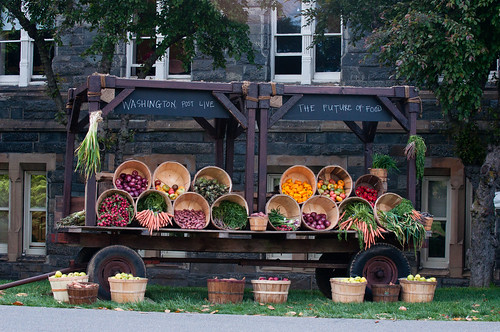
Washington Post sponsored the Future of Food conference, a photo by Georgetown Voice Photos on Flickr.
On May 4, Washington Post Live held a conference on The Future of Food at Georgetown University. Thanks to the power of the interwebs, I was able to stream most of the conference from home and ended up doing my first live-tweet of anything (yay for that warm fuzzy electronic community feeling). But since that was mostly just quoting things people said, I wanted to blather on and on, I mean delve a little further, into what I took away from the event here and in some future posts.
I thought Prince Charles’s speech was excellent, in that it was very comprehensive, highlighting the interconnected webbiness that makes up the food system and why it’s imperative to consider that creating a truly sustainable system. The speech and the conference overall showed how food is not monolithic, and that it is in fact “part of a wider socioeconomic landscape.” What’s going on in one part of the system will have real impacts elsewhere. And for food that means the current system has real impacts on climate change and the health of the environment and people. So some of the solutions that Prince Charles presented are large and complex but important to consider, with calls to deepen our understanding between food, energy, water and economic security; taking steps with the whole system in mind, which means we must value and support local communities; and consider agriculture as an entire culture, not solely as an industry.
That distinction of agri-culture vs. agri-industry falls into that familiar divide between feeeeelings versus cold hard calculations, the messy complexities of cultures versus the orderly business of numbers, all so often treated as though never the twain shall or should meet. It’s easy to speak about food as industry, business, markets…. advocacy within these lines means voting with one’s wallet—change through affecting consumer demand and business practices. That approach is significant in some ways, but individual wallets can only tilt the balance so much and address a few threads of the web that is largely woven by the big wallets. (Great, now I’m imagining a weird wallet-spider evil-leggy thing selling sugary things.) In regards to industrial vs organic agriculture, Sec. Vilsack’s declaration to let the market decide, let consumers choose, made me shake my head. Lack of public information and transparency in the food system, amongst other things, means that consumers often have no such choice and they'll be caught by the scary wallet-spider thing.
